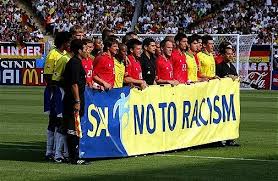By Mark Baber
December 1 – A UNESCO and Juventus-backed report on the fight against discrimination and racism in football has just been published, aiming to give an overview of the challenge of tackling unacceptable racist, xenophobic and intolerant views and making some concrete recommendations for clubs in how to propagate messages of tolerance, respect and inclusion.
The wide-ranging 83-page report, written by academics Albrecht Sonntag and David Ranc, both Professors at the ESSCA School of Management, is based on a mix of research into legal norms regarding tackling racism in various countries, review of previous research and interviews with a wide-range of people concerned with tackling discrimination across football.
The report writers try to cover a vast amount of ground, whilst justifying the euro-centrism of their approach on the grounds that, “Europe has a unique position with its leading competitions, championships and clubs.”
Interestingly, the report is heavily influenced by the work of German sociologist Norbert Elias and his theory regarding civilisation processes. Everyone interested in football and discrimination (and particularly racism) will find much of interest in this report and also much to discuss and argue over, particularly given the tendency of the writers to make wide and unsupported generalisations (for instance over Russia and homophobia).
The report was prepared between October 2014 and May 2015 but interestingly does mention one of the problems in the new landscape of football that “while both FIFA and UEFA actually have a positive record on this front and are at the origin of credible policy and innovative initiatives, surveys show that both suffer from low trust in their sincerity and leadership.”
The recommendations of the report, which are firmly rooted in seeing football as a social arena in which “supporters need to be educated,” are based on “a series of good practices” mainly from Europe and include four main recommendations:
1. “Building on lessons learned from the success of political correctness” to influence a change in the use of vocabulary and ingrain habits of self-censorship.
2. Limiting sanctions of fans and other actors to individuals rather than imposing collective sanctions which are described as “ethically wrong, highly controversial and counterproductive.”
3. Emphasising education which plays an essential role in the combat against racism and discrimination.
4. Football clubs should develop a ‘civic brand management’ (or ‘corporate social responsibility’) in line with their increased economic power.
The executive summary and full report can be read at http://www.juventus.com/media/native/csr/Report_eng.pdf
Contact the writer of this story at moc.l1745120047labto1745120047ofdlr1745120047owedi1745120047sni@r1745120047ebab.1745120047kram1745120047

